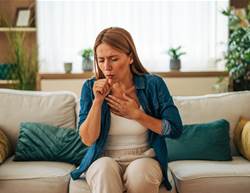If you’ve ever had sudden vomiting and diarrhoea, you might have experienced norovirus, one of the most common causes of gastroenteritis. This highly contagious virus spreads quickly in schools, childcare centres, aged care facilities and cruise ships, causing severe nausea, stomach cramps and dehydration.
While norovirus outbreaks tend to be more common in cooler months, cases can occur year-round—especially in settings where people are in close contact.
“Norovirus is extremely unpleasant,” says Dr Thomas Russo, a professor and an infectious disease expert. “Many people report having diarrhoea on the toilet while vomiting into the sink at the same time.”
The virus spreads through contaminated food, surfaces and person-to-person contact, making handwashing and hygiene critical in stopping transmission, says Dr Russo.
Though there is no specific medication or vaccine, doctors share expert-backed strategies to ease symptoms, prevent dehydration and recover faster.
Doctor’s tips for treating the stomach bug
Unfortunately, there is no specific medication to treat norovirus or a vaccine to prevent it. However, doctors say there are a few things you can do at home to stay as comfortable as possible (and hopefully therefore speed up your recovery!) while dealing with the illness.
Take small sips of liquids
Dehydration is a big concern with norovirus, making it important to try to stay as hydrated as possible, Dr William Schaffner, an infectious disease specialist and professor says. “Take small sips of fluids,” he says. “You don’t want to put too much in your stomach at once because it may come up right away.”
Replenish electrolytes
Drinks that contain electrolytes, like sports drinks, are a good option if you have them, Dr Russo says. “You can even try watered-down juices to give you glucose,” he says. (When you’re dealing with vomiting and diarrhoea, your glucose—a.k.a. blood sugar—levels can dip, Dr Russo explains. Having glucose in this situation may help increase your energy levels.)
Take acetaminophen
If you feel like you can keep it down, paracetamol can help combat a fever and any aches and pains you may have, Dr Russo says. However, he suggests avoiding nonsteroidal anti-inflammatory drugs (NSAIDs) like ibuprofen. “Some people can get gastric irritation with them,” Dr Russo says. “You’ve already got something irritating your stomach and you don’t want to pile on.”
Try to eat something bland
If your stomach won’t tolerate it, Dr Schaffner stresses that you’ll be OK just having liquids for a day or two. But if you feel like you can get something down, focus on “eating something bland,” says Dr Amesh A. Adalja. That includes focusing on the BRAT diet (bananas, rice, applesauce, toast) until your nausea and vomiting have stopped.
When to see a doctor for the stomach bug
The good news, if there is any with norovirus: People tend to feel better within one to three days.
But if you have vomiting and diarrhoea that won’t stop, severe weakness, or you’re an older adult, Dr Adalja recommends seeking medical attention. Doctors will likely want to give you IV fluids and an anti-emetic medication, which can help to stop the vomiting.
If you’re uncomfortable but feel like you can handle this illness at home on your own, Dr Russo recommends just focusing on your fluid intake. “The main concern is dehydration,” he says.
Again, norovirus is incredibly contagious. “Have family members keep their distance from you,” Dr Schaffner says. “When you vomit, you can create an aerosol of the virus that can infect someone else, even if they’re being very careful with you. It’s best to separate yourself.”










